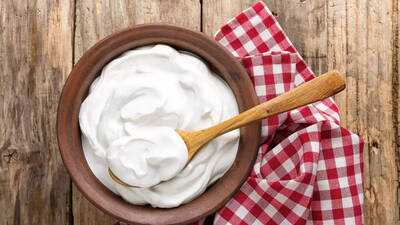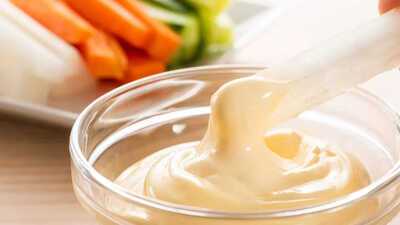That quick reach into your fridge door feels so convenient, milk cartons, eggs, juice bottles, everything neatly lined up. But here’s the catch: the fridge door is actually the least safe place for some of your most perishable foods. The constant opening and closing exposes them to warm air, which can cut their shelf life short and even put your health at risk.
According to the U.S. Department of Agriculture (USDA), the refrigerator door is the warmest part of your fridge and should never be used for items that need consistently cold temperatures. For food safety, your fridge should stay at 40ºF (4ºC) or lower, but the door simply can’t maintain that stability. That’s why experts recommend storing certain items deep inside the fridge instead of the door.
If you’ve been guilty of stocking eggs, milk, or even meat in the door racks, it’s time to rethink. Make no mistake, the fridge door is the danger zone. Here are 9 everyday items you should never store in your fridge door.
9 everyday items you should never store in your fridge door
Milk

It might seem logical to pop milk cartons into the door, but this is one of the worst places for them. Milk is highly perishable and needs a consistent cold environment. In the door, every time you open the fridge, it gets exposed to warm air, which speeds up spoilage and can make it unsafe to drink sooner than you expect.
Eggs

Many fridges come with a built-in egg tray in the door, but that design is misleading. Eggs stay fresher for longer when stored inside the fridge, away from fluctuating temperatures. Keeping them in the door increases the risk of bacterial growth, which can cause foodborne illnesses.
Butter

While butter doesn’t spoil as quickly as milk, the door’s uneven temperature can still make it soften too much and lose its texture. If you want to keep butter spreadable, a covered dish on the counter is fine for a day or two, but for longer storage, the middle or back of the fridge is best.
Cheese

Cheese, especially soft varieties like mozzarella, brie, or cream cheese, needs steady cooling to prevent mould and spoilage. The door won’t provide that, so store it in the cheese drawer or a sealed container in the main fridge compartment.
Juice

Cartons or bottles of juice seem perfect for the door, but fresh juices, especially, can ferment or sour quickly when exposed to fluctuating temperatures. It’s safer to keep them on an inside shelf to preserve freshness and taste.
Meat

Raw meat should never go in the fridge door. It requires the coldest, most stable environment to slow bacterial growth. Storing it in the door increases the risk of contamination and food poisoning. The bottom shelf of your fridge is the safest place for meat.
Yoghurt

Like milk, yoghurt needs to be kept cold consistently to maintain its probiotics and prevent spoilage. The door’s temperature changes can shorten its shelf life and affect its texture, making it watery or sour too soon.
Mayonnaise

Once opened, mayonnaise becomes highly perishable. The oils and eggs in it are prone to spoilage if not stored in a stable, cold environment. Keeping it in the door can make it spoil faster, so always store it deep inside the fridge.
Salad dressings

Dressings, especially creamy ones, are best kept away from the door. While vinaigrettes may last a bit longer, any dressing that contains dairy, eggs, or mayonnaise should stay in the main compartment to ensure safety and taste.
The fridge door is handy for condiments, sauces, or drinks that aren’t highly perishable, but not for staples like milk, eggs, or meat.
For longer freshness and food safety, always store these items deeper inside where the cold is steady.
Also read| People who should avoid eating guavas and why
According to the U.S. Department of Agriculture (USDA), the refrigerator door is the warmest part of your fridge and should never be used for items that need consistently cold temperatures. For food safety, your fridge should stay at 40ºF (4ºC) or lower, but the door simply can’t maintain that stability. That’s why experts recommend storing certain items deep inside the fridge instead of the door.
If you’ve been guilty of stocking eggs, milk, or even meat in the door racks, it’s time to rethink. Make no mistake, the fridge door is the danger zone. Here are 9 everyday items you should never store in your fridge door.
9 everyday items you should never store in your fridge door
Milk

It might seem logical to pop milk cartons into the door, but this is one of the worst places for them. Milk is highly perishable and needs a consistent cold environment. In the door, every time you open the fridge, it gets exposed to warm air, which speeds up spoilage and can make it unsafe to drink sooner than you expect.
Eggs
Many fridges come with a built-in egg tray in the door, but that design is misleading. Eggs stay fresher for longer when stored inside the fridge, away from fluctuating temperatures. Keeping them in the door increases the risk of bacterial growth, which can cause foodborne illnesses.
Butter
While butter doesn’t spoil as quickly as milk, the door’s uneven temperature can still make it soften too much and lose its texture. If you want to keep butter spreadable, a covered dish on the counter is fine for a day or two, but for longer storage, the middle or back of the fridge is best.
Cheese
Cheese, especially soft varieties like mozzarella, brie, or cream cheese, needs steady cooling to prevent mould and spoilage. The door won’t provide that, so store it in the cheese drawer or a sealed container in the main fridge compartment.
Juice

Cartons or bottles of juice seem perfect for the door, but fresh juices, especially, can ferment or sour quickly when exposed to fluctuating temperatures. It’s safer to keep them on an inside shelf to preserve freshness and taste.
Meat
Raw meat should never go in the fridge door. It requires the coldest, most stable environment to slow bacterial growth. Storing it in the door increases the risk of contamination and food poisoning. The bottom shelf of your fridge is the safest place for meat.
Yoghurt
Like milk, yoghurt needs to be kept cold consistently to maintain its probiotics and prevent spoilage. The door’s temperature changes can shorten its shelf life and affect its texture, making it watery or sour too soon.
Mayonnaise
Once opened, mayonnaise becomes highly perishable. The oils and eggs in it are prone to spoilage if not stored in a stable, cold environment. Keeping it in the door can make it spoil faster, so always store it deep inside the fridge.
Salad dressings

Dressings, especially creamy ones, are best kept away from the door. While vinaigrettes may last a bit longer, any dressing that contains dairy, eggs, or mayonnaise should stay in the main compartment to ensure safety and taste.
The fridge door is handy for condiments, sauces, or drinks that aren’t highly perishable, but not for staples like milk, eggs, or meat.
For longer freshness and food safety, always store these items deeper inside where the cold is steady.
Also read| People who should avoid eating guavas and why
You may also like

One Lakh Stray Dogs in Pimpri-Chinchwad, 11,000 Bite Cases in 4 Months — What's the Status of PCMC Shelters?

Mumbai: Special POCSO Court Acquits Tuition Teacher Accused Of Touching Student Due To Lack Of Crucial Evidence

'No shortage of urea', Telangana Minister assures farmers

Chennai Weather: IMD Predicts Light To Moderate Rainfall; Check Temperatures, Humidity & More

Maharashtra: Luxury Bus Catches Fire On Mumbai-Goa Highway, 44 Passengers Escape Unhurt






